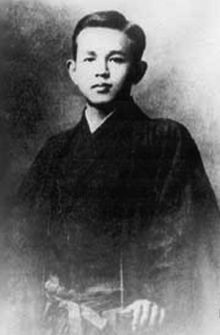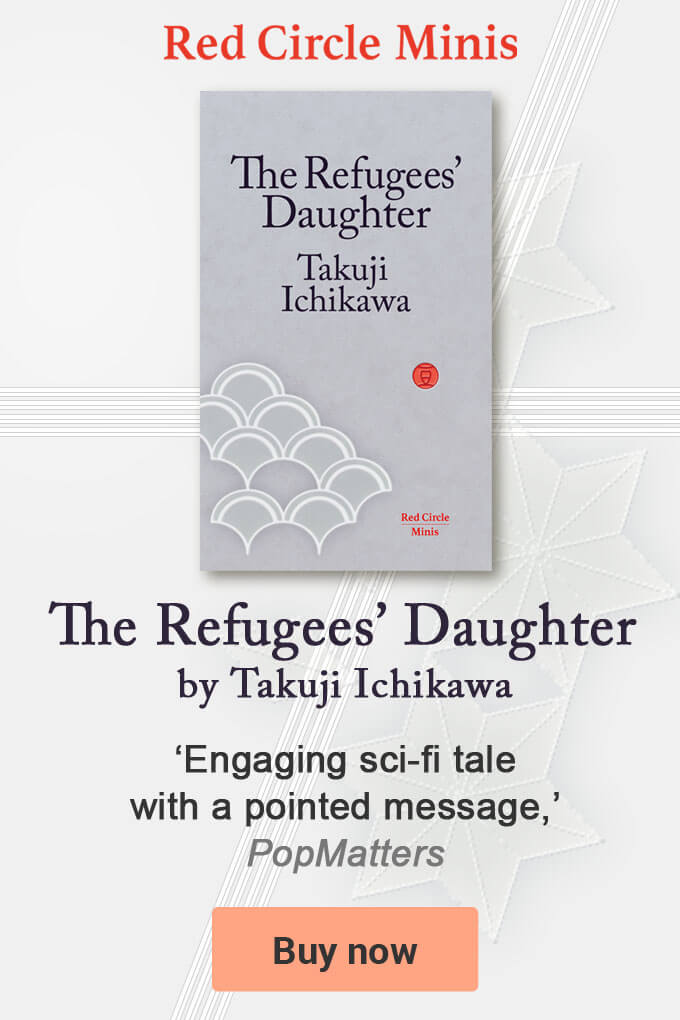 Statue of poet Ishikawa Takuboku (1886-1912), Hakodate, Hokkaido, Japan. Source: Wikipedia
Statue of poet Ishikawa Takuboku (1886-1912), Hakodate, Hokkaido, Japan. Source: WikipediaThe Takuboku Festival will take place in Shibutami, Iwate Prefecture in North Eastern Japan, where Takuboku spent his childhood. It is an annual event that has been celebrating the poet’s life and work since shortly after the end of World War II. This year will mark the 106th anniversary of the poet’s death.
Takuboku was a master of the tanka, a type of traditional Japanese verse that literarily means ‘short poem’. The freshness, honesty and startling imagery of his work brought him immediate success and popularity following the publication of his first major collection Ichiaku no Suna (A Handful of Sand), a collection of 551 poems, in 1910.
This collection, alongside Kanashiki Gangu (Sad Toys), published two months after his death in 1912, are considered his major and most important works.
Much has been published and said about Takuboku, who has been called ‘the first modern Japanese’, ‘a provincial romantic’, as well as (in his time) ‘shameless’ and a ‘firebrand’.
 The spot, marked by a “poem monument,” where, as a 15-year-old, Takuboku laid down in the grass and felt his heart “being seized by the sky.” Photograph: Roger Pulvers.
The spot, marked by a “poem monument,” where, as a 15-year-old, Takuboku laid down in the grass and felt his heart “being seized by the sky.” Photograph: Roger Pulvers.Pulvers, who is regarded as an international expert on Takuboku, as well as on the poet and author Kenji Miyazawa (1896-1933), also from Iwate and famous for his poem Strong in the Rain, is regularly requested to give speeches at events related to Takuboku and Japanese literature. In 2015, for example, Pulvers gave a talk titled ‘The Soul Brothers of Meiji Japan’ at an international academic conference on Takuboku held at Sydney University.
After his keynote address, which is titled ‘My Friend Takuboku Ishikawa,’ Pulvers and Takuboku Memorial Museum Director Yoshimasa Mori will hold a dialogue on stage about the legacy that the poet has left for us.
The festival takes place on 9 June and includes a recital by musicians from the Morioka Municipal Shibutami Primary School and the Morioka Municipal Shibutami Middle School as well as a series of linked events including a haiku competition and tanka party.
An essay on Takuboku by Pulvers and a selection of poems by Takuboku, with English translations by Pulvers, are included below for reference. Pulvers has won awards for his translations of Japanese poetry and prose, including The Noma Award for the Translation of Japanese Literature.
- THOROUGHLY OUR CONTEMPORARY TAKUBOKU ISHIKAWA
 Takuboku Ishikawa (1886-1912). Image: Wikipedia.
Takuboku Ishikawa (1886-1912). Image: Wikipedia.Any translation would have to capture these two seemingly contradictory qualities: concreteness and suggestiveness. I had always been unmoved by the kinds of translations of haiku and tanka that seemed, for lack of a better term, “pseudo-Oriental.” The wispy and puffy nature of the language used in the translation, often without subject or verb, left the poems hanging in the air. This quality presumed to capture the symbolic redolence of the original.
But to me this was always a misreading of the original qualities. Yes the originals are evocative and redolent. Yet these very qualities must be clearly stated in a translation for them to evoke those effects. This may sound paradoxical, that you need to be very clear and concrete in order to be vague and suggestive. I believe it to be evident.
The reverberations enter the mind and heart after the poem is taken in. Let the light radiate in all its beauty and subtlety after it leaves the perfect surfaces the cut diamond.
Each genre of translation presents a different variety of challenge and demands a separate kind of talent.
Translating a short story or a novel is the easiest. You ask yourself what the author is trying to say and how they are trying to say it. You create a voice for the author/narrator of the story and speak with it in your own language.
Translating a play is not so easy. The characters have a life of their own—what might be called a “verbal personality”—and this has to be expressed in different voices. It is not enough “to become” the playwright. You need to be able to faithfully reproduce the speech patterns and quirky logic used by a number of people. You need to create many authentic voices.
Translating poetry is the hardest of all. The poems have to work in your own language as poems. If they don’t, no matter how “faithful” you are to the language of the original, no matter how textually correct you are, the result will be unsatisfactory. Readers will naturally react by saying, “I’m sorry, but I just don’t see why the work of this poet is valued so highly in their own country.” You have to recreate not only the language, voice and personality of the poet but also the mood, nuances and suggestiveness of the poems.
Among poetry translation, the rendering of haiku and tanka into another language presents the greatest difficulty. It is like climbing a mountain covered in dangerous crevices, roads to nowhere and formidable cliffs. I have found this the case in the 50 years I have spent translating the poetry of Kenji Miyazawa.
With Takuboku the crevices seem even deeper, the roads to nowhere more frequently encountered, and the cliffs high enough to strain your neck just looking up at them. That is why I avoided climbing Mt. Takuboku. Suggestiveness, multiple reverberating meanings, ambivalence, extreme lyricism and unashamed sentimentality, brevity … and all done in a package that has a concrete poetic message. I didn’t consider myself up to the task. How would it be possible to render this into English and come out with a poem at the end that leaves a strong impression on the reader?
Translation of poetry is similar to directing in the theatre. You need to have a stark and clear vision of the whole—in the case of poetry, the poem; in the case of theatre, the play—in order to achieve an artistic effect. You cannot just have the actors speak the dialogue and assume that the audience will glean meaning and dramatic impact from the words. You cannot just translate the words of a poem literally and correctly and assume that the reader will be moved. You need to ask yourself in the case of poetry, “What is this poem trying to say? What impact on the emotions and the intellect is the poet aiming for?” In order to translate a poem, you need to interpret its words in a context that will make perfect sense to the person who reads it in a foreign language.
Though he died more than a century ago, Takuboku is in many ways our contemporary. He is in touch with his subconscious mind in a way that resonates with us. Modern psychology and psychiatry have opened up new worlds of understanding of human nature.
Takuboku anticipates many aspects of this understanding. He is brutally frank about the relationships he is in with family and friends, as objective about his own foibles as he is about those of others. He is socially and politically committed; and he is self-deprecating about his inability or reluctance to take action. Had he been writing in a language like English or French or German or any other frequently translated European language, I am convinced he would have had an immense influence on world literature. As it is, he has had that influence on Japanese literature and on the culture of the Japanese people.
It is a coincidence, perhaps, that Japan’s two greatest modern poets, Ishikawa Takuboku and Miyazawa Kenji, were born about 50 kilometres from each other, were only 10 years apart in age and went to the same middle school. Both also died young from tuberculosis, Takuboku at 26 and Kenji at 37.
But Takuboku achieved much greater fame than Kenji in the 20th century. Even in their native Iwate, children studied and memorized Takuboku’s tanka for decades, while Kenji was thought of as somehow being non-mainstream, not “representative” of Japanese culture. Today both poets are celebrated equally all around Japan.
Kenji was a supernova that exploded in 1933, but it took more than half a century for the light to reach us. Takuboku has always been a shower of shooting stars, the kind of shower that comes back year after year and never ceases to dazzle and delight us.
It is my fervent wish that the light from the poetry of these two poets will reach people all over the world for many years to come.
 Photo of Mt. Iwate taken from Shibutami. Photograph: Roger Pulvers.
Photo of Mt. Iwate taken from Shibutami. Photograph: Roger Pulvers.Nostalgia for home is one of the most powerful themes in Takuboku’s tanka, and it is a nostalgia that we today can certainly recognize and identify with. The sense of loneliness that pervades the tanka—a loneliness expressed in his often-used word kanashii (sad, sorrowful, plaintive, touching)—derives from this nostalgia.
To Takuboku home was not just a place of natural beauty. The sounds of his native dialect were the music in his ears. I think that many people around the world feel this way about their dialect or, in the case of people living in a country where a foreign language is spoken, their native language.
I know of many foreigners in Japan who watch satellite news broadcasts from their country not specifically to learn what’s happening but just to feel the comfort of hearing the sounds of their native language. There is nothing more natural and human than this. People who don’t speak a foreign language or don’t really have a native dialect (like most people in Tokyo, for instance) may find this hard to understand.
Obviously, too, his home town reminds him of the time he was a child, and most people look back to their childhood with deep emotions of one sort or another. It is hard to be indifferent to your childhood. To Takuboku such reminiscing usually brings tears to his eyes. The volume of tears in Takuboku’s tanka is large indeed.
He can be assaulted by them anywhere and unawares. Suddenly an autumn wind will blow and he will be transported back home … and tears will flow, or if not tears, a flood of regrets. Kenji, in that sense, is a much freer traveller. He is generally ecstatic when “on the road.” He is not always drawn home. Kenji looks outward to discover the world; Takuboku looks inward to discover the world. Both poets, however, are deeply affected by their own mental state when they write. Both find joy in sadness and sadness in joy.
Both poets, too, are obsessed with modernity. Coming from what was a rather remote location in Japan at the time, trains and electric lights and all sorts of other inventions appear often in their works. Takuboku wrote his works in the late Meiji era (1869-1912), and Kenji in the Taisho (1912-1926) and early Showa (1926-1989) eras .
Yet the presence of modern technology and its importance to their view of the world is equally strong. Their nostalgia is not a nostalgia for the past per se. They are thoroughly modern men and they both believe in human progress, economic development and the social betterment of humankind. They may have been seen as being “provincial” by some people in Tokyo, but they are genuine forward-looking cosmopolitans … and thoroughly our contemporaries in every sense of the word but time.
Some tanka by Takuboku Ishikawa, translated by Roger Pulvers, appearing in the book cited below.
AT THE STATION
I slip into the crowd
Just to hear the accent
Of my faraway home town.
ふるさとの訛なつかし
停車場の人ごみの中に
そを聴きにゆく
SEEING OFF AT THE TRAIN STATION
My wife came with our daughter on her back.
I caught sight of her eyebrows
Through a blanket of snow.
子を負ひて
雪の吹き入る停車場に
われ見送りし妻の眉かな
IN MY MIND’S EYE
I weep for the willows
With their tender young leaves
On the banks of my river at home.
やはらかに柳あをめる
北上の岸辺目に見ゆ
なけとごとくに
MY HOME TOWN
I face the mountains
speechless.
I owe those mountains everything.
ふるさとの山に向かいて
言うことなし
ふるさとの山はありがたきかな
NEVER FAR
I miss the mountains of Shibutami.
I miss the rivers of Shibutami.
They are never far from my mind.
かにかくに渋民村は恋しかり
おもひでの山
おもひでの川
ON A LARK
I lifted my mother onto my back.
She was so light I wept
Stopped dead after three steps.
たはむれに母を背負いて
そのあまり軽きに泣きて
三歩あゆまず
FATHERS AND SONS
Why is the air so thick between them?
Apart in spirit when facing each other
Close in absolute silence.
親と子と
はなればなれの心もて静かに対ふ
気まづきや何ぞ
MY SON WHO DIED AGE ONE MONTH
Oh, the sorrow of his skin
That stayed warm
Until the rising of the sun.
かなしくも
夜明くるまでは残りいぬ
息きれし児の肌のぬくもり
This essay is a revised and re-edited excerpt from Roger Pulvers’ book of 199 translated tanka by Takuboku Ishikawa, The Illusion of Self – reading Takuboku in English.
 About Red Circle:Red Circle Authors Limited is a specialist publishing and communications company that conducts bespoke projects on behalf of a carefully selected and curated group of leading Japanese authors. Red Circle showcases Japan’s best creative writing. For more information on Red Circle, Japanese literature, and Red Circle authors please visit: www.redcircleauthors.com.
About Red Circle:Red Circle Authors Limited is a specialist publishing and communications company that conducts bespoke projects on behalf of a carefully selected and curated group of leading Japanese authors. Red Circle showcases Japan’s best creative writing. For more information on Red Circle, Japanese literature, and Red Circle authors please visit: www.redcircleauthors.com.



